University Commercial and Corporation Law Case Study Analysis
VerifiedAdded on 2021/06/17
|9
|1660
|42
Case Study
AI Summary
This case study analyzes a commercial law scenario involving Peninsula Tours and Gareth, focusing on contract law principles. The assignment explores the issues of whether Peninsula Tours can claim compensation due to Gareth's failure to provide the agreed number of cars, and what remedies are available to Gareth. It delves into the rules of part payment of debt and promissory estoppel, referencing key cases like Pinnel's case, Central London Property Trust Ltd v High Trees Ltd, and Combe v Combe. The application section applies these principles to the case facts, determining the validity of Peninsula Tours' claim and Gareth's potential defense using promissory estoppel. The conclusion summarizes the findings on both issues, and the assignment includes a comprehensive list of references.
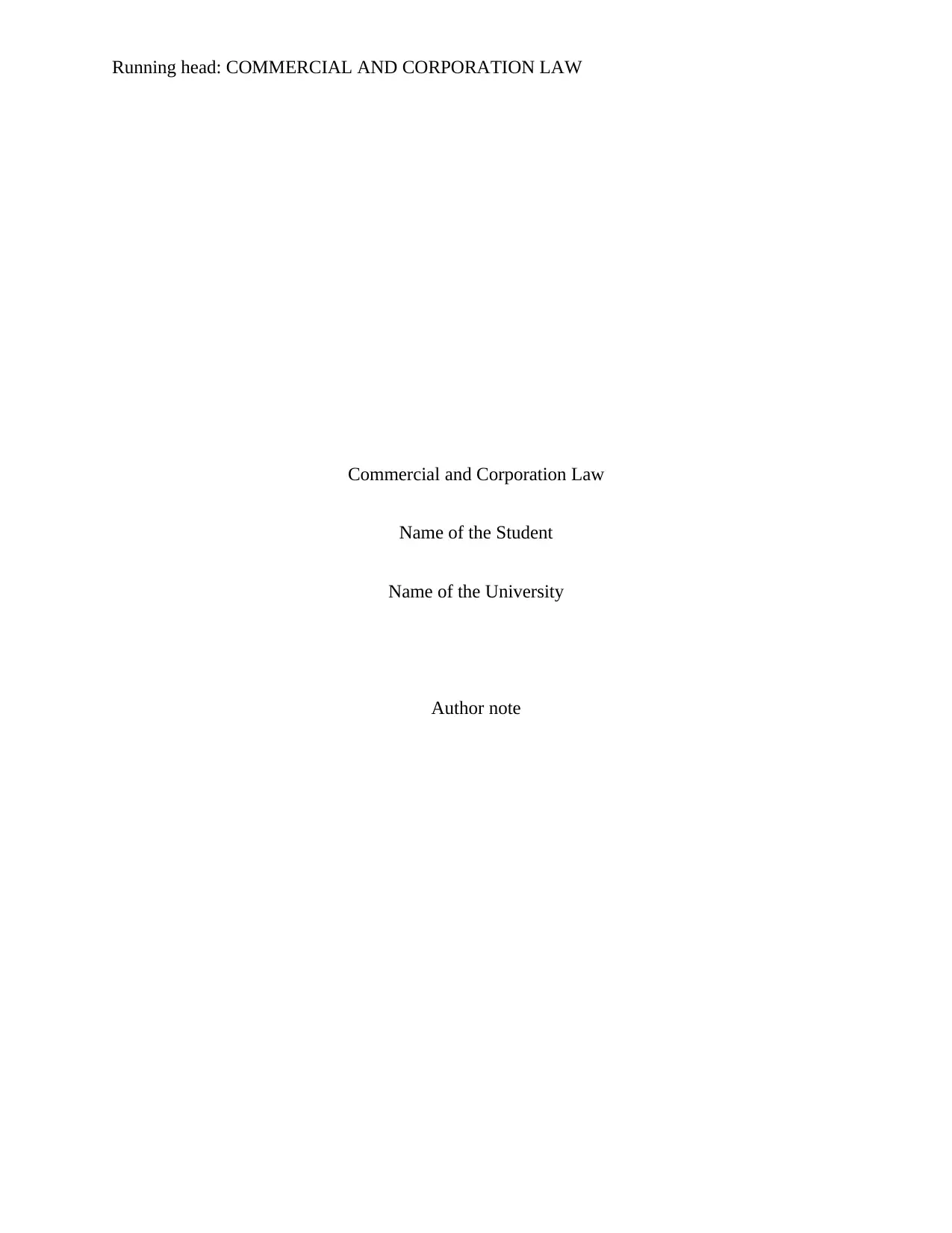
Running head: COMMERCIAL AND CORPORATION LAW
Commercial and Corporation Law
Name of the Student
Name of the University
Author note
Commercial and Corporation Law
Name of the Student
Name of the University
Author note
Paraphrase This Document
Need a fresh take? Get an instant paraphrase of this document with our AI Paraphraser
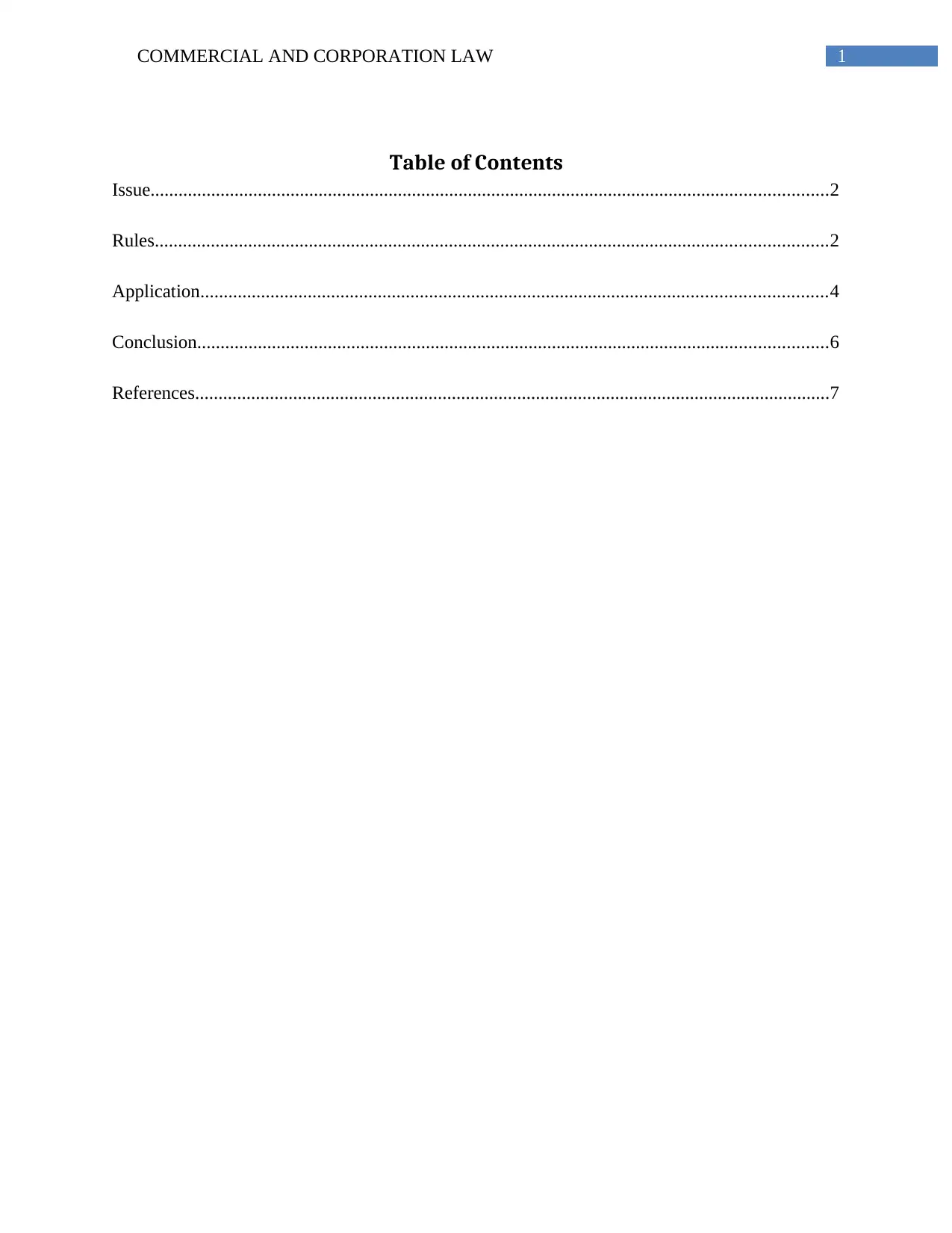
1COMMERCIAL AND CORPORATION LAW
Table of Contents
Issue.................................................................................................................................................2
Rules................................................................................................................................................2
Application......................................................................................................................................4
Conclusion.......................................................................................................................................6
References........................................................................................................................................7
Table of Contents
Issue.................................................................................................................................................2
Rules................................................................................................................................................2
Application......................................................................................................................................4
Conclusion.......................................................................................................................................6
References........................................................................................................................................7
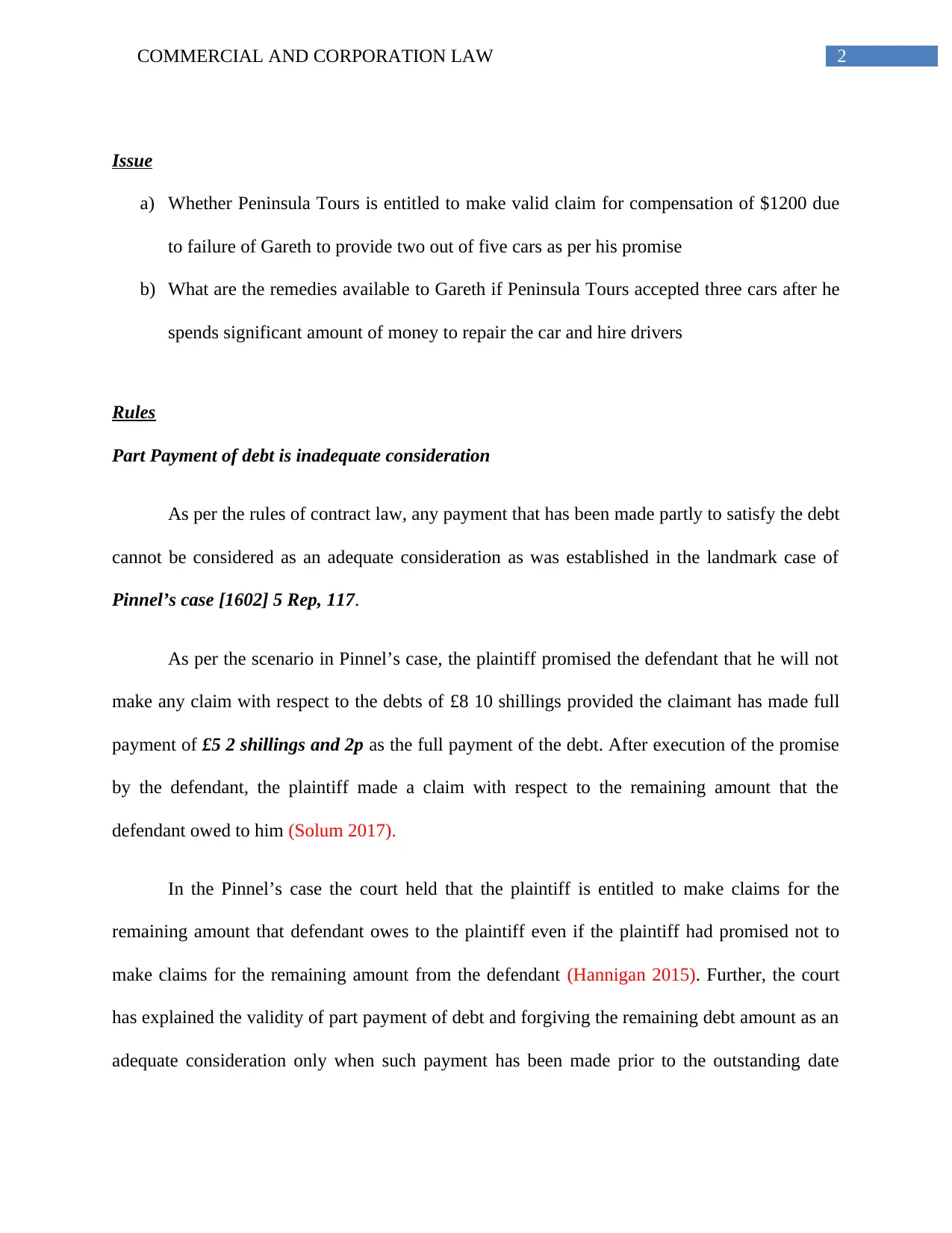
2COMMERCIAL AND CORPORATION LAW
Issue
a) Whether Peninsula Tours is entitled to make valid claim for compensation of $1200 due
to failure of Gareth to provide two out of five cars as per his promise
b) What are the remedies available to Gareth if Peninsula Tours accepted three cars after he
spends significant amount of money to repair the car and hire drivers
Rules
Part Payment of debt is inadequate consideration
As per the rules of contract law, any payment that has been made partly to satisfy the debt
cannot be considered as an adequate consideration as was established in the landmark case of
Pinnel’s case [1602] 5 Rep, 117.
As per the scenario in Pinnel’s case, the plaintiff promised the defendant that he will not
make any claim with respect to the debts of £8 10 shillings provided the claimant has made full
payment of £5 2 shillings and 2p as the full payment of the debt. After execution of the promise
by the defendant, the plaintiff made a claim with respect to the remaining amount that the
defendant owed to him (Solum 2017).
In the Pinnel’s case the court held that the plaintiff is entitled to make claims for the
remaining amount that defendant owes to the plaintiff even if the plaintiff had promised not to
make claims for the remaining amount from the defendant (Hannigan 2015). Further, the court
has explained the validity of part payment of debt and forgiving the remaining debt amount as an
adequate consideration only when such payment has been made prior to the outstanding date
Issue
a) Whether Peninsula Tours is entitled to make valid claim for compensation of $1200 due
to failure of Gareth to provide two out of five cars as per his promise
b) What are the remedies available to Gareth if Peninsula Tours accepted three cars after he
spends significant amount of money to repair the car and hire drivers
Rules
Part Payment of debt is inadequate consideration
As per the rules of contract law, any payment that has been made partly to satisfy the debt
cannot be considered as an adequate consideration as was established in the landmark case of
Pinnel’s case [1602] 5 Rep, 117.
As per the scenario in Pinnel’s case, the plaintiff promised the defendant that he will not
make any claim with respect to the debts of £8 10 shillings provided the claimant has made full
payment of £5 2 shillings and 2p as the full payment of the debt. After execution of the promise
by the defendant, the plaintiff made a claim with respect to the remaining amount that the
defendant owed to him (Solum 2017).
In the Pinnel’s case the court held that the plaintiff is entitled to make claims for the
remaining amount that defendant owes to the plaintiff even if the plaintiff had promised not to
make claims for the remaining amount from the defendant (Hannigan 2015). Further, the court
has explained the validity of part payment of debt and forgiving the remaining debt amount as an
adequate consideration only when such payment has been made prior to the outstanding date
⊘ This is a preview!⊘
Do you want full access?
Subscribe today to unlock all pages.

Trusted by 1+ million students worldwide
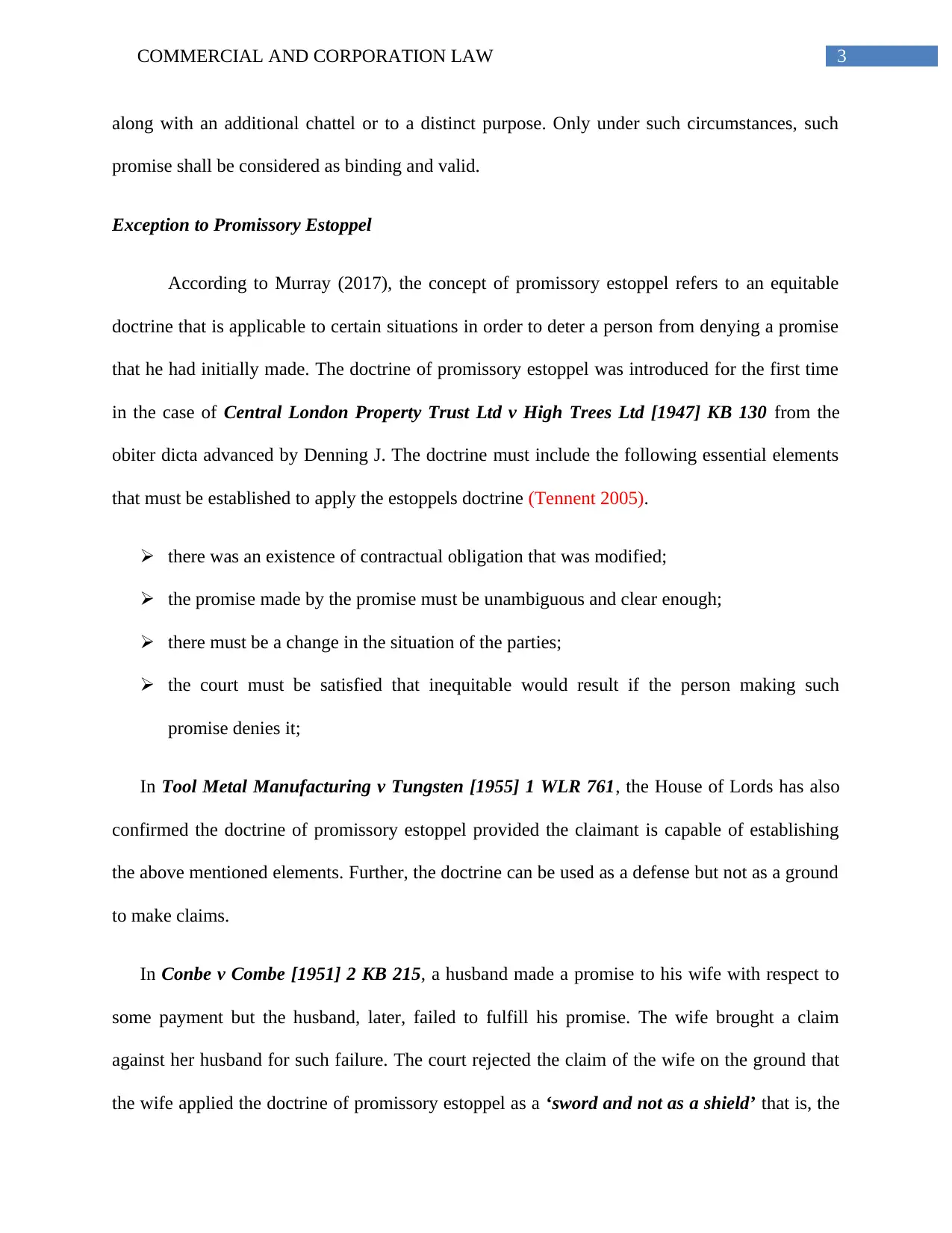
3COMMERCIAL AND CORPORATION LAW
along with an additional chattel or to a distinct purpose. Only under such circumstances, such
promise shall be considered as binding and valid.
Exception to Promissory Estoppel
According to Murray (2017), the concept of promissory estoppel refers to an equitable
doctrine that is applicable to certain situations in order to deter a person from denying a promise
that he had initially made. The doctrine of promissory estoppel was introduced for the first time
in the case of Central London Property Trust Ltd v High Trees Ltd [1947] KB 130 from the
obiter dicta advanced by Denning J. The doctrine must include the following essential elements
that must be established to apply the estoppels doctrine (Tennent 2005).
there was an existence of contractual obligation that was modified;
the promise made by the promise must be unambiguous and clear enough;
there must be a change in the situation of the parties;
the court must be satisfied that inequitable would result if the person making such
promise denies it;
In Tool Metal Manufacturing v Tungsten [1955] 1 WLR 761, the House of Lords has also
confirmed the doctrine of promissory estoppel provided the claimant is capable of establishing
the above mentioned elements. Further, the doctrine can be used as a defense but not as a ground
to make claims.
In Conbe v Combe [1951] 2 KB 215, a husband made a promise to his wife with respect to
some payment but the husband, later, failed to fulfill his promise. The wife brought a claim
against her husband for such failure. The court rejected the claim of the wife on the ground that
the wife applied the doctrine of promissory estoppel as a ‘sword and not as a shield’ that is, the
along with an additional chattel or to a distinct purpose. Only under such circumstances, such
promise shall be considered as binding and valid.
Exception to Promissory Estoppel
According to Murray (2017), the concept of promissory estoppel refers to an equitable
doctrine that is applicable to certain situations in order to deter a person from denying a promise
that he had initially made. The doctrine of promissory estoppel was introduced for the first time
in the case of Central London Property Trust Ltd v High Trees Ltd [1947] KB 130 from the
obiter dicta advanced by Denning J. The doctrine must include the following essential elements
that must be established to apply the estoppels doctrine (Tennent 2005).
there was an existence of contractual obligation that was modified;
the promise made by the promise must be unambiguous and clear enough;
there must be a change in the situation of the parties;
the court must be satisfied that inequitable would result if the person making such
promise denies it;
In Tool Metal Manufacturing v Tungsten [1955] 1 WLR 761, the House of Lords has also
confirmed the doctrine of promissory estoppel provided the claimant is capable of establishing
the above mentioned elements. Further, the doctrine can be used as a defense but not as a ground
to make claims.
In Conbe v Combe [1951] 2 KB 215, a husband made a promise to his wife with respect to
some payment but the husband, later, failed to fulfill his promise. The wife brought a claim
against her husband for such failure. The court rejected the claim of the wife on the ground that
the wife applied the doctrine of promissory estoppel as a ‘sword and not as a shield’ that is, the
Paraphrase This Document
Need a fresh take? Get an instant paraphrase of this document with our AI Paraphraser
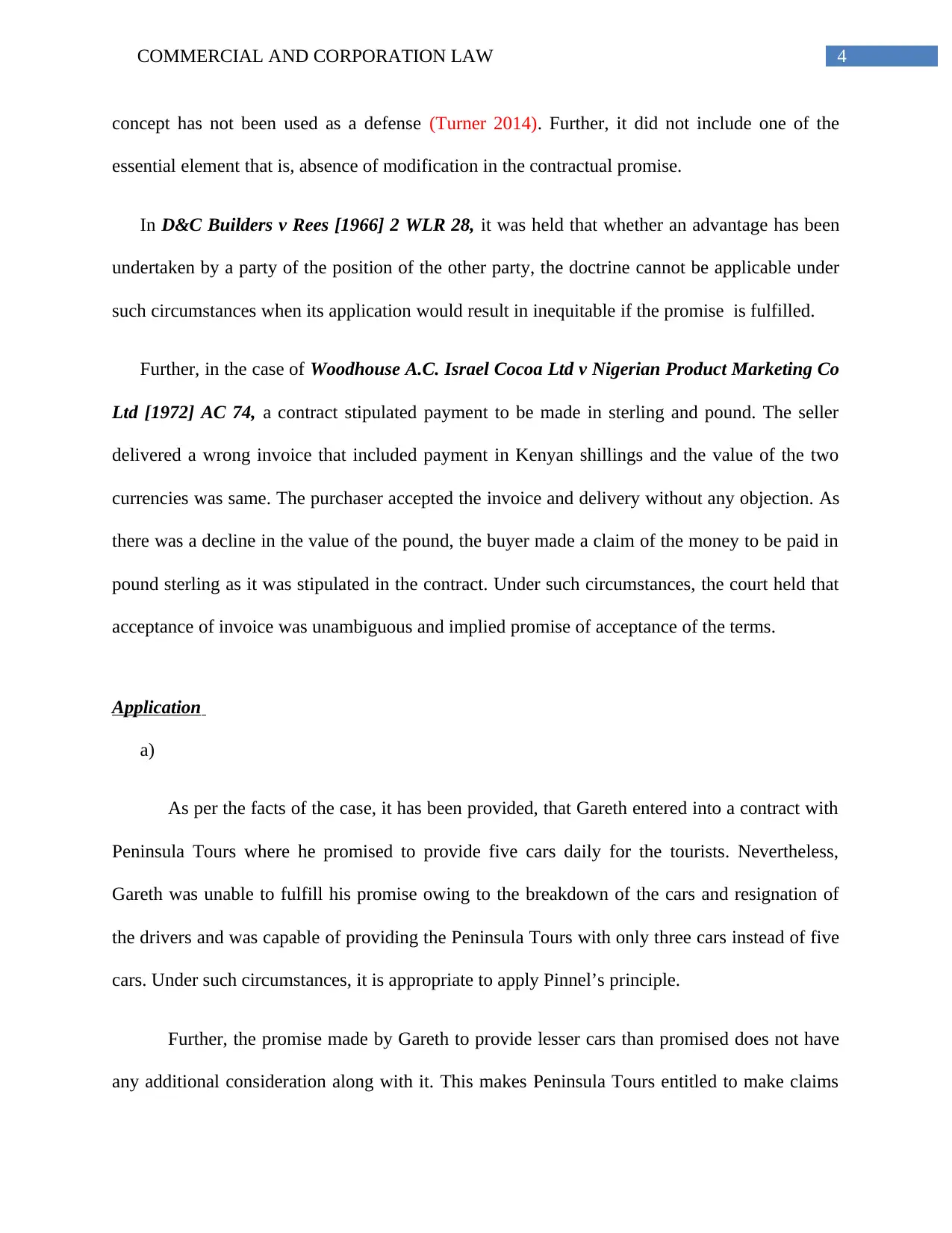
4COMMERCIAL AND CORPORATION LAW
concept has not been used as a defense (Turner 2014). Further, it did not include one of the
essential element that is, absence of modification in the contractual promise.
In D&C Builders v Rees [1966] 2 WLR 28, it was held that whether an advantage has been
undertaken by a party of the position of the other party, the doctrine cannot be applicable under
such circumstances when its application would result in inequitable if the promise is fulfilled.
Further, in the case of Woodhouse A.C. Israel Cocoa Ltd v Nigerian Product Marketing Co
Ltd [1972] AC 74, a contract stipulated payment to be made in sterling and pound. The seller
delivered a wrong invoice that included payment in Kenyan shillings and the value of the two
currencies was same. The purchaser accepted the invoice and delivery without any objection. As
there was a decline in the value of the pound, the buyer made a claim of the money to be paid in
pound sterling as it was stipulated in the contract. Under such circumstances, the court held that
acceptance of invoice was unambiguous and implied promise of acceptance of the terms.
Application
a)
As per the facts of the case, it has been provided, that Gareth entered into a contract with
Peninsula Tours where he promised to provide five cars daily for the tourists. Nevertheless,
Gareth was unable to fulfill his promise owing to the breakdown of the cars and resignation of
the drivers and was capable of providing the Peninsula Tours with only three cars instead of five
cars. Under such circumstances, it is appropriate to apply Pinnel’s principle.
Further, the promise made by Gareth to provide lesser cars than promised does not have
any additional consideration along with it. This makes Peninsula Tours entitled to make claims
concept has not been used as a defense (Turner 2014). Further, it did not include one of the
essential element that is, absence of modification in the contractual promise.
In D&C Builders v Rees [1966] 2 WLR 28, it was held that whether an advantage has been
undertaken by a party of the position of the other party, the doctrine cannot be applicable under
such circumstances when its application would result in inequitable if the promise is fulfilled.
Further, in the case of Woodhouse A.C. Israel Cocoa Ltd v Nigerian Product Marketing Co
Ltd [1972] AC 74, a contract stipulated payment to be made in sterling and pound. The seller
delivered a wrong invoice that included payment in Kenyan shillings and the value of the two
currencies was same. The purchaser accepted the invoice and delivery without any objection. As
there was a decline in the value of the pound, the buyer made a claim of the money to be paid in
pound sterling as it was stipulated in the contract. Under such circumstances, the court held that
acceptance of invoice was unambiguous and implied promise of acceptance of the terms.
Application
a)
As per the facts of the case, it has been provided, that Gareth entered into a contract with
Peninsula Tours where he promised to provide five cars daily for the tourists. Nevertheless,
Gareth was unable to fulfill his promise owing to the breakdown of the cars and resignation of
the drivers and was capable of providing the Peninsula Tours with only three cars instead of five
cars. Under such circumstances, it is appropriate to apply Pinnel’s principle.
Further, the promise made by Gareth to provide lesser cars than promised does not have
any additional consideration along with it. This makes Peninsula Tours entitled to make claims
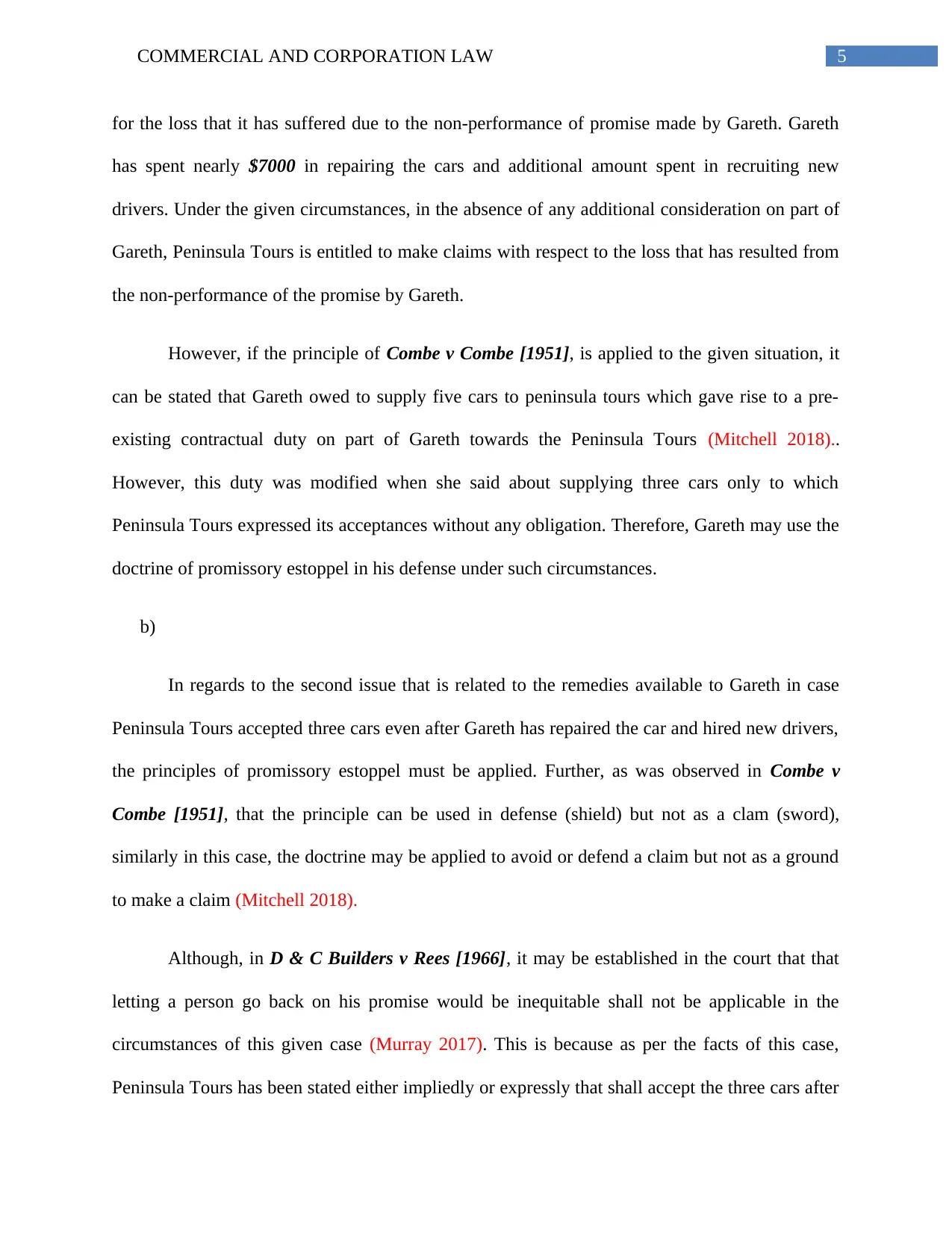
5COMMERCIAL AND CORPORATION LAW
for the loss that it has suffered due to the non-performance of promise made by Gareth. Gareth
has spent nearly $7000 in repairing the cars and additional amount spent in recruiting new
drivers. Under the given circumstances, in the absence of any additional consideration on part of
Gareth, Peninsula Tours is entitled to make claims with respect to the loss that has resulted from
the non-performance of the promise by Gareth.
However, if the principle of Combe v Combe [1951], is applied to the given situation, it
can be stated that Gareth owed to supply five cars to peninsula tours which gave rise to a pre-
existing contractual duty on part of Gareth towards the Peninsula Tours (Mitchell 2018)..
However, this duty was modified when she said about supplying three cars only to which
Peninsula Tours expressed its acceptances without any obligation. Therefore, Gareth may use the
doctrine of promissory estoppel in his defense under such circumstances.
b)
In regards to the second issue that is related to the remedies available to Gareth in case
Peninsula Tours accepted three cars even after Gareth has repaired the car and hired new drivers,
the principles of promissory estoppel must be applied. Further, as was observed in Combe v
Combe [1951], that the principle can be used in defense (shield) but not as a clam (sword),
similarly in this case, the doctrine may be applied to avoid or defend a claim but not as a ground
to make a claim (Mitchell 2018).
Although, in D & C Builders v Rees [1966], it may be established in the court that that
letting a person go back on his promise would be inequitable shall not be applicable in the
circumstances of this given case (Murray 2017). This is because as per the facts of this case,
Peninsula Tours has been stated either impliedly or expressly that shall accept the three cars after
for the loss that it has suffered due to the non-performance of promise made by Gareth. Gareth
has spent nearly $7000 in repairing the cars and additional amount spent in recruiting new
drivers. Under the given circumstances, in the absence of any additional consideration on part of
Gareth, Peninsula Tours is entitled to make claims with respect to the loss that has resulted from
the non-performance of the promise by Gareth.
However, if the principle of Combe v Combe [1951], is applied to the given situation, it
can be stated that Gareth owed to supply five cars to peninsula tours which gave rise to a pre-
existing contractual duty on part of Gareth towards the Peninsula Tours (Mitchell 2018)..
However, this duty was modified when she said about supplying three cars only to which
Peninsula Tours expressed its acceptances without any obligation. Therefore, Gareth may use the
doctrine of promissory estoppel in his defense under such circumstances.
b)
In regards to the second issue that is related to the remedies available to Gareth in case
Peninsula Tours accepted three cars even after Gareth has repaired the car and hired new drivers,
the principles of promissory estoppel must be applied. Further, as was observed in Combe v
Combe [1951], that the principle can be used in defense (shield) but not as a clam (sword),
similarly in this case, the doctrine may be applied to avoid or defend a claim but not as a ground
to make a claim (Mitchell 2018).
Although, in D & C Builders v Rees [1966], it may be established in the court that that
letting a person go back on his promise would be inequitable shall not be applicable in the
circumstances of this given case (Murray 2017). This is because as per the facts of this case,
Peninsula Tours has been stated either impliedly or expressly that shall accept the three cars after
⊘ This is a preview!⊘
Do you want full access?
Subscribe today to unlock all pages.

Trusted by 1+ million students worldwide

6COMMERCIAL AND CORPORATION LAW
Gareth has conducted repairing of the cars and hired new drivers due to the resignation given by
the old drivers.
Conclusion
In regards to the first issue, it can be stated that Gareth shall be entitled to defend a claim
of $1200 from Peninsula Tours by using the doctrine of promissory estoppel as it shall be used as
defense and not a s aground to make claims. However, with respect to the second issue, Gareth
shall not be able to succeed in making any claim against Peninsula Tours for non-acceptance of
the cars.
Gareth has conducted repairing of the cars and hired new drivers due to the resignation given by
the old drivers.
Conclusion
In regards to the first issue, it can be stated that Gareth shall be entitled to defend a claim
of $1200 from Peninsula Tours by using the doctrine of promissory estoppel as it shall be used as
defense and not a s aground to make claims. However, with respect to the second issue, Gareth
shall not be able to succeed in making any claim against Peninsula Tours for non-acceptance of
the cars.
Paraphrase This Document
Need a fresh take? Get an instant paraphrase of this document with our AI Paraphraser
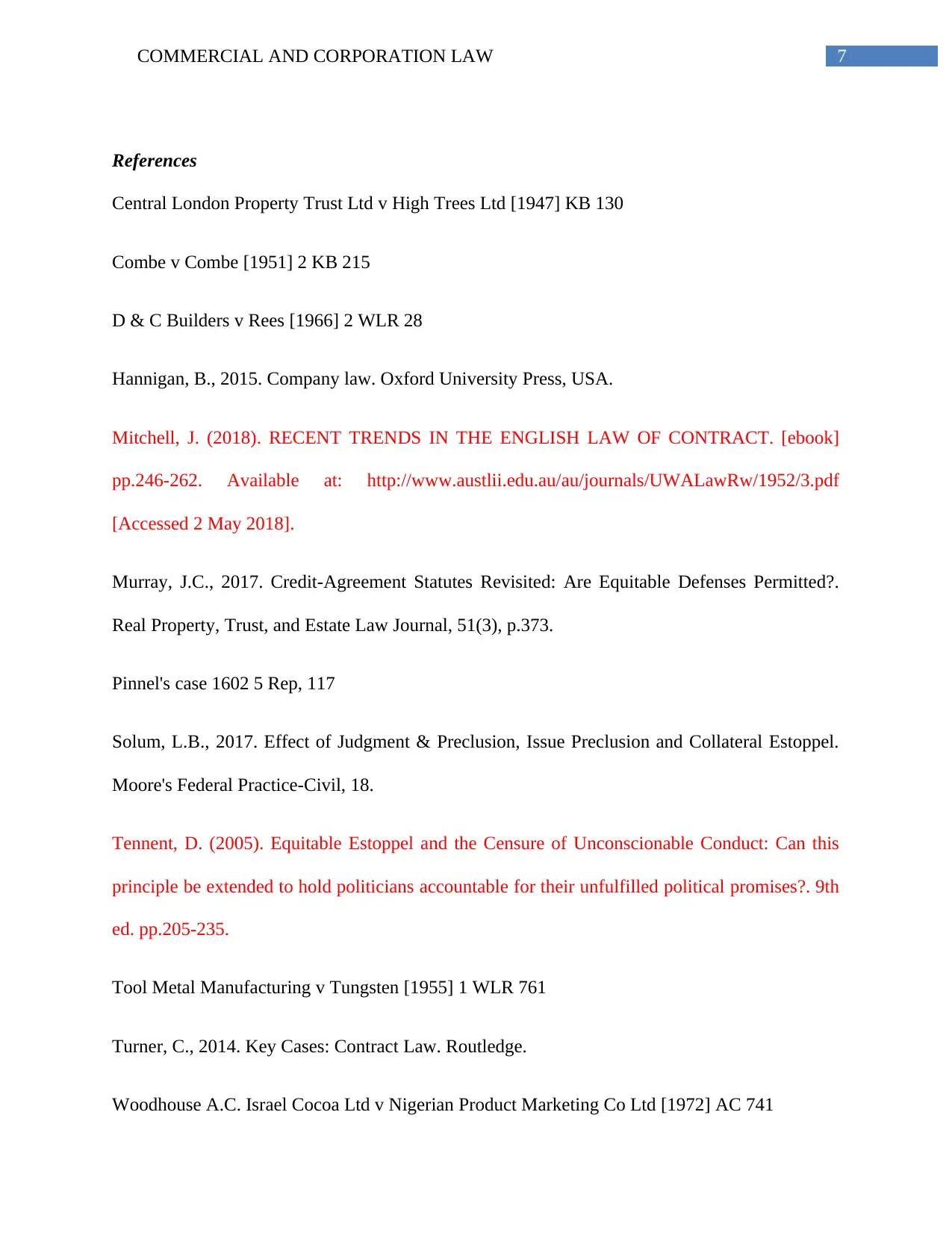
7COMMERCIAL AND CORPORATION LAW
References
Central London Property Trust Ltd v High Trees Ltd [1947] KB 130
Combe v Combe [1951] 2 KB 215
D & C Builders v Rees [1966] 2 WLR 28
Hannigan, B., 2015. Company law. Oxford University Press, USA.
Mitchell, J. (2018). RECENT TRENDS IN THE ENGLISH LAW OF CONTRACT. [ebook]
pp.246-262. Available at: http://www.austlii.edu.au/au/journals/UWALawRw/1952/3.pdf
[Accessed 2 May 2018].
Murray, J.C., 2017. Credit-Agreement Statutes Revisited: Are Equitable Defenses Permitted?.
Real Property, Trust, and Estate Law Journal, 51(3), p.373.
Pinnel's case 1602 5 Rep, 117
Solum, L.B., 2017. Effect of Judgment & Preclusion, Issue Preclusion and Collateral Estoppel.
Moore's Federal Practice-Civil, 18.
Tennent, D. (2005). Equitable Estoppel and the Censure of Unconscionable Conduct: Can this
principle be extended to hold politicians accountable for their unfulfilled political promises?. 9th
ed. pp.205-235.
Tool Metal Manufacturing v Tungsten [1955] 1 WLR 761
Turner, C., 2014. Key Cases: Contract Law. Routledge.
Woodhouse A.C. Israel Cocoa Ltd v Nigerian Product Marketing Co Ltd [1972] AC 741
References
Central London Property Trust Ltd v High Trees Ltd [1947] KB 130
Combe v Combe [1951] 2 KB 215
D & C Builders v Rees [1966] 2 WLR 28
Hannigan, B., 2015. Company law. Oxford University Press, USA.
Mitchell, J. (2018). RECENT TRENDS IN THE ENGLISH LAW OF CONTRACT. [ebook]
pp.246-262. Available at: http://www.austlii.edu.au/au/journals/UWALawRw/1952/3.pdf
[Accessed 2 May 2018].
Murray, J.C., 2017. Credit-Agreement Statutes Revisited: Are Equitable Defenses Permitted?.
Real Property, Trust, and Estate Law Journal, 51(3), p.373.
Pinnel's case 1602 5 Rep, 117
Solum, L.B., 2017. Effect of Judgment & Preclusion, Issue Preclusion and Collateral Estoppel.
Moore's Federal Practice-Civil, 18.
Tennent, D. (2005). Equitable Estoppel and the Censure of Unconscionable Conduct: Can this
principle be extended to hold politicians accountable for their unfulfilled political promises?. 9th
ed. pp.205-235.
Tool Metal Manufacturing v Tungsten [1955] 1 WLR 761
Turner, C., 2014. Key Cases: Contract Law. Routledge.
Woodhouse A.C. Israel Cocoa Ltd v Nigerian Product Marketing Co Ltd [1972] AC 741

8COMMERCIAL AND CORPORATION LAW
⊘ This is a preview!⊘
Do you want full access?
Subscribe today to unlock all pages.

Trusted by 1+ million students worldwide
1 out of 9
Related Documents
Your All-in-One AI-Powered Toolkit for Academic Success.
+13062052269
info@desklib.com
Available 24*7 on WhatsApp / Email
![[object Object]](/_next/static/media/star-bottom.7253800d.svg)
Unlock your academic potential
Copyright © 2020–2026 A2Z Services. All Rights Reserved. Developed and managed by ZUCOL.





